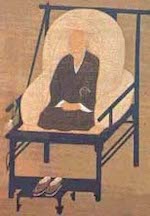Koso Wasan 60
Though we may commit evil throughout our lives,
If we say the nembutsu always
With our hearts turned wholly to Amida,
Our obstructions fall away by the [Vow's] spontaneous working.
Outsiders

In the Contemplation Sutra there is a category of human being described as 'the lowest of the lowest grade'. These are the people who, under normal circumstances, we could not even begin to think of as having the slightest possibility of redemption. The pith of the passage in the sutra runs thus:
... the sentient beings who commit such evils as the five gravest offences, the ten evil acts and all kinds of immorality. ... may meet a good teacher, who consoles [them] in various ways, teaching [them] the wonderful dharma and urging [them] to be mindful of the Buddha; but they are too tormented to do so. The good teacher then advises them, 'If you cannot concentrate on the Buddha, then you should say instead, Homage to Amitayus Buddha' (Namo Amida Butsu).' Because they call the Buddha's Name... they are born ... in the Land of Utmost Bliss.1
By any stretch of the imagination, these people are just not Buddhists. They are subversive, dangerous people; but this is beside the point because true religion is for the salvation of all. Yes there are absolute outsiders, abominable, unwelcome people but the Primal Vow will take them in when they hear it, accept Other Power shinjin and say the Name.
Revelation is an unfolding process. All religious traditions undergo a process whereby insight deepens and these, previously buried, insights are accepted - as long as they are consistent with the original principles of the founder. Shakyanumi taught that he came to bring relief to 'all beings'. Not once did he say that his teaching was exclusively directed at 'monks and nice, good people'.2 In this sense Tao-ch'o was a great reformer, calling the Buddhist community back to its original principles by pointing out the genuine meaning of the sutras - especially the sutras that have come to be associated with the Pure Land tradition.
So Tao-ch'o did a daring thing: he re-wrote the wording of the eighteenth Vow in the Larger Sutra. This is the Vow that is usually seen as the focal point in the expression of the Primal Vow. In most recensions of the sutra - especially the version that is the 'canonical' text of the Chinese Pure Land stream - there is an exclusion clause. Although Amida buddha is characterised as saying that those who, with 'serene faith' hear his Name, will attain birth in the Pure Land, there is a final sentence that says that those who commit 'the Five Grave offences and abuse the right Dharma' will be excluded from this Vow. However, Tao-ch'o's read this as a cautionary gloss. His famous student, Shan-tao (613-681), also adopted that interpretation.
When Tao-ch'o quotes the eighteenth Vow in the An-le-chi he, therefore, deliberately omits this clause of exclusion. No one, no matter how evil or depraved, is excluded from the workings of the Primal Vow. This, of course, has its counterpart in the mundane world - for all of us will die. As Rennyo Shonin said, social status, wealth or virtue do not save us from death.
In Other Power faith, Namo Amida Butsu, we stop resisting Amida Buddha's wisdom; and just as, one day, we will draw our last breath; so, one day, we will stop resisting the light, which 'embraces and does not forsake'.
1: TPLS2, p. 98.
2: 'As this birth is a buddha's birth, it is my last birth. Just in this one birth I shall save all!' - Buddhacarita: In Praise of Buddha's Acts, Numata Centre for Buddhist Translation and Research, 2009, p. 4.